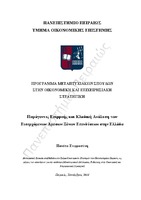Παράγοντες επιρροής και κλαδική ανάλυση των εισερχόμενων άμεσων ξένων επενδύσεων στην Ελλάδα
Determinants and sector analysis of inward foreign direct investment in Greece

Προβολή/
Θεματική επικεφαλίδα
Επενδύσεις, Ξένες -- Ελλάδα ; Investments, Foreign -- GreeceΠερίληψη
Οι άμεσες ξένες επενδύσεις (Α.Ξ.Ε.) διαδραματίζουν καθοριστικό ρόλο στην εποχή της παγκοσμιοποίησης, καθώς συνεισφέρουν σημαντικά στην ενίσχυση των οικονομιών πολλών χωρών. Πρόκειται για επενδύσεις που στηρίζουν και ισχυροποιούν την οικονομία μιας χώρας, καθώς βελτιώνουν τις υποδομές, συνεισφέρουν στην ανάπτυξη νέων τεχνικών και δεξιοτήτων και οδηγούν σε ταχεία αύξηση των οικονομικών πόρων της χώρας αυτής. Συνεπώς, οι άμεσες ξένες επενδύσεις ωφελούν ποικιλοτρόπως μια χώρα και για τον λόγο αυτό παρέχονται ολοένα και περισσότερα κίνητρα από τα κράτη για την διατήρηση και την ενίσχυση των επενδύσεων αυτών στην επικράτειά τους. Η παρούσα μελέτη έχει ως στόχο την διερεύνηση των εισερχόμενων άμεσων ξένων επενδύσεων κατά κλάδο στην Ελλάδα και τους παράγοντες που επηρεάζουν την εισροή των Α.Ξ.Ε. στην χώρα. Αρχικά, παρατίθεται το ιστορικό πλαίσιο των άμεσων ξένων επενδύσεων στην Ελλάδα, διερευνώνται τυχόν αυξομειώσεις των εισερχόμενων Α.Ξ.Ε. κατά τα τελευταία χρόνια, καθώς επίσης και οι αιτίες δημιουργίας των αυξομειώσεων αυτών. Επιπρόσθετα, συντελείται η επεξεργασία και η ανάλυση των δεδομένων για τις εισερχόμενες άμεσες ξένες επενδύσεις κατά κλάδο οικονομικής δραστηριότητας και παρουσιάζονται οι κλάδοι με την μεγαλύτερη δραστηριότητα. Στη συνέχεια, πραγματοποιείται η εξέταση των κύριων προσδιοριστικών παραγόντων που ασκούν σημαντική επίδραση στις Α.Ξ.Ε., η οποία λαμβάνει χώρα μέσω οικονομετρικής ανάλυσης με την βοήθεια του στατιστικού πακέτου STATA. Τα δεδομένα της οικονομετρικής ανάλυσης αντλήθηκαν από τον OECD, την World Bank και την UNCTAD, για τα έτη 1978 έως 2012. Ως εξαρτημένη μεταβλητή χρησιμοποιήθηκαν οι κυλιόμενοι μέσοι όροι των εισερχόμενων Α.Ξ.Ε., ενώ σαν ανεξάρτητες μεταβλητές οι κυλιόμενοι μέσοι όροι του ακαθάριστου εθνικού εισοδήματος, της συναλλαγματικής ισοτιμίας, του μοναδιαίου κόστους εργασίας, των τηλεφωνικών γραμμών ανά 100 άτομα, των πατεντών, του ονομαστικού επιτοκίου δανεισμού της Ελλάδας αφαιρώντας το ονομαστικό επιτόκιο δανεισμού της Γερμανίας, του ανοίγματος της οικονομίας, του πληθυσμού της Ελλάδας, του φορολογικού συντελεστή εισοδήματος και της ανεργίας ως ποσοστού του εργατικού δυναμικού της χώρας. Από τα αποτελέσματα που προέκυψαν, διαφαίνεται ότι οι εισερχόμενες Α.Ξ.Ε. επηρεάζονται θετικά από το ακαθάριστο εθνικό εισόδημα και από την συναλλαγματική ισοτιμία, ενώ επηρεάζονται αρνητικά από το μοναδιαίο κόστος εργασίας, πράγμα που σημαίνει ότι το φθηνό εργατικό δυναμικό είναι ισχυρός πόλος έλξης των άμεσων ξένων επενδύσεων για μια χώρα.


